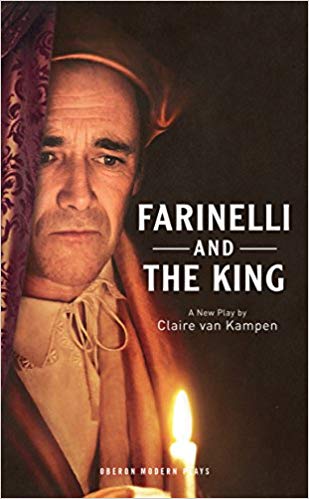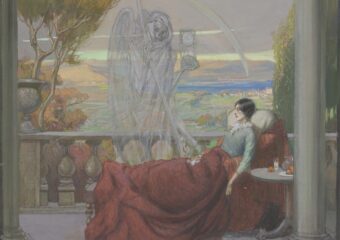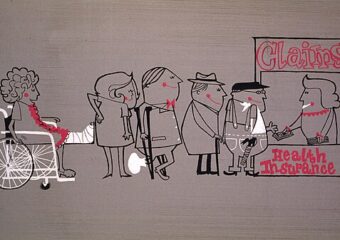Playwright: Clare van Kampen
Director: John Dove
Performance venue: Belasco Theater, New York, NY
Theater Run: 17 December 2017 through 25 March 2018
Run time: 150 minutes
According to the Art:
The play is the story of a real-life, eighteenth–century King of Spain and his mental illness that could be tamed only when his castrato sang to him. Though the play has historical interest in itself, it highlights the concept of “medical eros” and how it can be distinguished from “medical logos.”
Synopsis:
Anyone walking through a theater district over the past several decades and even centuries ago would likely run into a mad king—Lear, Richard III, George III, Scar. As of 2015, there’s a new mad king to be found in theater districts—King Philippe of Spain in Farinelli and the King.
The play opens with King Philippe of Spain sitting up in his bed talking to a goldfish swimming around in its bowl trying to avoid the hook at the end of the King’s little fishing pole:
I was touched by the confidence with which you speak to me of your affairs; the cordiality of your offer to redress mine; the tender anxiety for my health—but I should tell you in the strictest confidence you understand…shh…here the body cares very little for the affairs of the mind.
Act 1, Scene 1
As the King’s mental illness progresses from this point and becomes a concern of his court, his wife, Queen Isabella is sent away so that the King cannot physically harm her as he had before. But, what’s to be done for him? It’s the year 1737. While attending an opera in London, the Queen thinks she may have discovered just what the King needs—the renowned castrato Farinelli:
Then…he began. A long note, held; I must think it was beyond a minute. A swooping, soaring sound and the notes were above the tree-tops, bird-like, unimaginable. When the aria finished just now I couldn’t help my tears; I was unable to move; I just stared at the stage, where he had been…I couldn’t believe what I had seen and heard…I felt something had profoundly changed within me. …and then, —I knew…That I must hope somehow to bring Farinelli to Spain with me.
Act 1, Scene 3
The Queen finds a way to bring Farinelli back to Spain, and Farinelli begins to sooth the mad King with his voice from the heavens. The King becomes calmer yet when he moves with the Queen and Farinelli to a house in the forest, where he cuts a hole in the trees so he can hear the “hidden notes” of the spheres above. The King tells Farinelli, “you must sing to me; in the long hours of dark, when my mind is screaming in the silence, then that is when I need you to sing to me.” (Act 2, Scene 5)
The Queen was sure Farinelli’s singing was effective:
And they say it was Farinelli that helped to restore the health of the King of Spain—just by hearing this wonderful singing voice the King rose out of his depression and wanted to live again! It was the only thing the King could bear in the end. The sound of Farinelli’s voice.
Act 2, Scene 5
In Farinelli’s own and immodest assessment: “He is decidedly better because of me, and in his lonely life I have become a song he now depends on.” (Act 2, Scene 1) And, in making his clinical assessment, the King’s doctor was “of the opinion that the King’s illness has turned.” (Act 1, Scene 4)
The utopian existence comes to an end when the King is called back to Madrid to take on an impending English invasion. He would not be seen again.
This fanciful tale is not so fanciful; it’s drawn from the historical King Philippe of Spain. His grandfather, King Louis XIV of France, placed him there, and there he reigned for almost 50 years. Indeed he was mad, and indeed his wife the Queen brought the renowned castrato Farinelli back to Spain where he served the King for nine years and then the son who succeeded him until this son’s death. From there Farinelli retired to the Italian countryside instead of returning to the public stages in Europe.
The New York production of 2017–2018 could not replicate Farinelli’s voice exactly now that castrati are not to be found anymore; however, a countertenor was able to produce a swooping and soaring sound. Though Farinelli’s voice could not be replicated perfectly, the staging of the play was replicated as the audience of the day would have seen it in the mid seventeen–hundreds. The lighting was supplied by candlelight from chandeliers and sconces that were part of the sets. The musicians supporting Farinelli’s performances were also situated on the stage with him. And, as the theaters were arranged then, seats for the audience were available on both sides of the stage.
Analysis:
The Queen exposed King Philippe to music through Farinelli as he performs it, and not as he planned it as a specific intervention with a particular clinical outcome in mind. Thus, the play reveals the nuance between being exposed to music during an illness and being treated with music for a diagnosis with a pathological basis. Based David Morris’ book, Eros and Illness, David B. Morris, I am drawn to say this distinction conforms to the difference between medical logos and medical eros.
Medical logos refers to modern day Biomedicine that for the most part comprises explanations for known disease processes and treatments derived from accepted scientific theory and methods. Medical logos works through reason and application of evidence as standards of practice require. The contemporary form of medical logos that involves applying music as a treatment is music therapy, a therapy that is sought. Music therapy interventions often take place in clinical settings and are managed by therapists who are registered or certified, and who bear the countenance of health care professionals.
Medical eros refers to the desires that can exist as part of an illness experience and can become a source of succor. In contrast to medical logos, medical eros operates independently of scientific knowledge and certainty of any degree, and is more the product of emotions, impulses, psychic forces, and chaos. Yet, while medical logos and medical eros can be seen as irreconcilable “contraries,” Morris suggests that medical eros can be harnessed to address elements of illness medical logos can’t affect as well.
Simply put: biomedicine, both in clinical practice and in bench science, ignores the role of desire in illness. Desire, legitimized as medical eros, offers a power that can help make the passage through illness far less onerous, a power that offers a more truly ‘personalized’ medicine than genetic profiles alone can promise.
p. 16
Queen Isabella saw that music pierced through the King’s illness, and so she thought that satisfying this desire might produce therapeutic effects for him; she was right. Many people learning of this story could be tempted to think of the Queen as an early practitioner if not founder of music therapy. But, it would be better to think of her as a practitioner of medical eros because she chose to expose the King to music in an uncontrolled and natural manner rather than treat the King with music as recommended in guidelines derived from clinical studies and established theories. In an episode of the podcast, The Clinic & The Person, Morris made a point about the importance of knowing that a person wants something, before we can know a person has a specific desire, that is, we should not make an inference as such. Farinelli benefitted from music, but initially the Queen exposed him to it before he sought it. But after this exposure, he sought Farinelli and kept him close by and thus I am comfortable attributing a desire for music to the King
As it relates to contemporary health care, the play shows how an illness experience can manifest not just in signs and symptoms, but also in desires, and these desires can lead to ways other than traditional biomedical interventions to help sick people. Practical application of this concept may not be realistic in the early twenty–first century clinic where, as Morris describes it, “the preference for rationality and control helps explain why medicine, when it doesn’t openly reject the erotic as unruly…simply ignores it as irrelevant.” (p. 23) Perhaps this play can find a place in the medical humanities canon and in health care professions education curriculums to break through that barrier to take desires into account as part of illness experiences.
Also:
The part of King Philippe V was played by Mark Rylance, who is a three-time Tony Award winner.
The play received Tony award nominations in 2018 for: best play; best performance by an actor in a leading role in a musical; best scenic design in a play; best costume design in a play; and best lighting design in a play.
Page numbers for quotes are from: David B. Morris, Eros and Illness. Cambridge, MA: Harvard University Press, 2017. My blog piece on this book is here.
A version of this review is posted at the NYU Literature, Are and Medicine Database.



